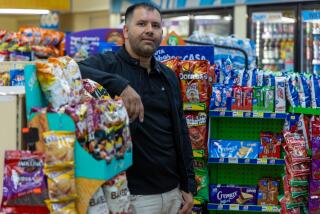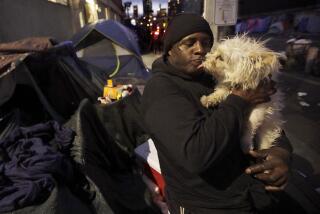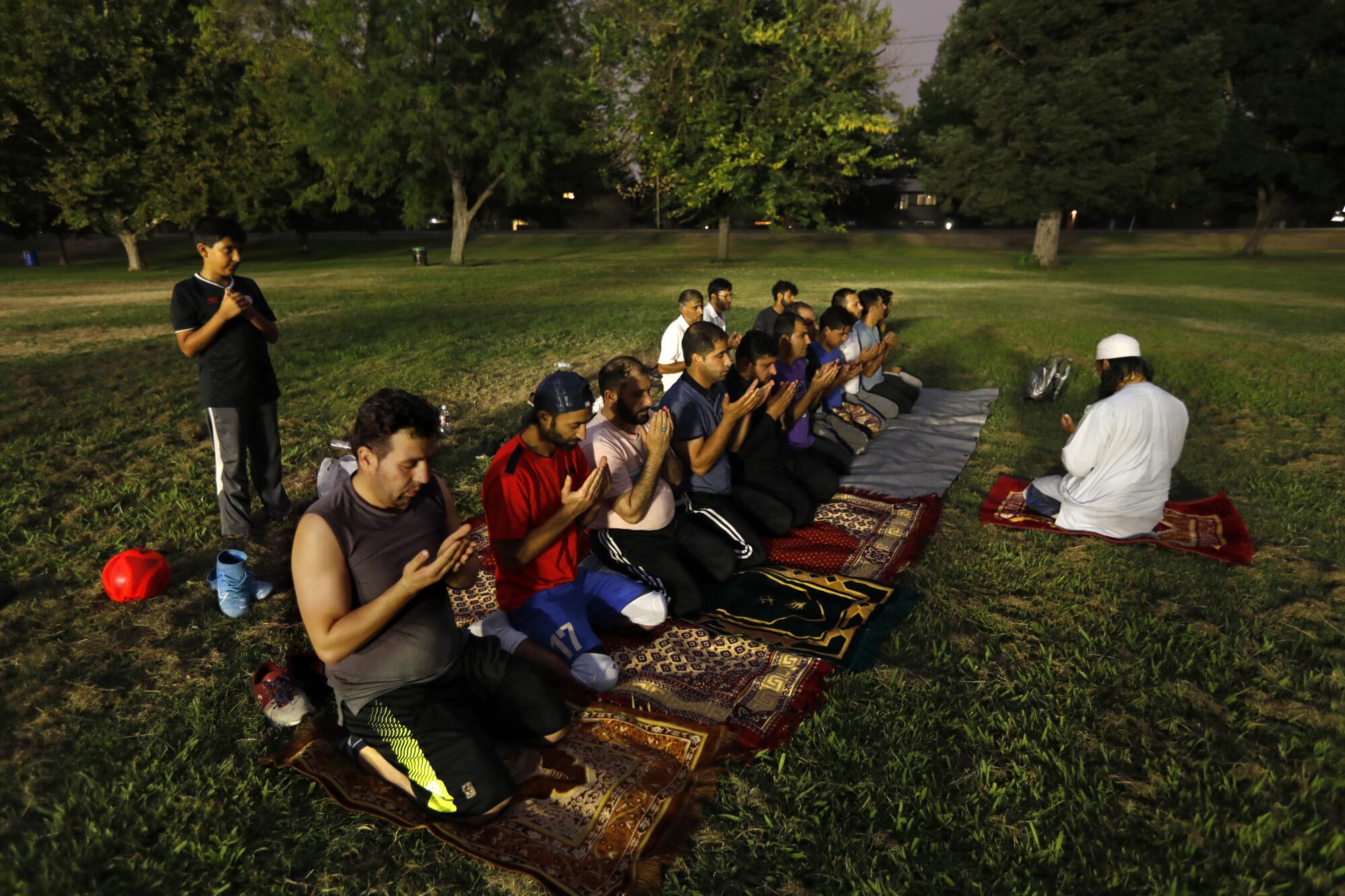
- Share via
SACRAMENTO — The Afghan American men spiked their volleyball shots with an anxious intensity as twilight fell on the fourth night of the Taliban’s takeover of their home country.
Between games, they stared stone-faced at their phones, where urgent messages from family members pinged relentlessly, supplications for help from those now trapped in enemy territory.
The nightly gathering, once a means of holding on to what they had lost since fleeing Afghanistan in recent years, had morphed into a bitter reminder of the difficult trade they made in migrating to California: safety for family.

Here in Arden Arcade, a Sacramento neighborhood known for low rents in run-down apartments, Afghan refugees stressed that the United States’ obligations to help those who furthered the U.S. mission should not end when migrants land on American soil — as many felt it had for them.
From there begins a long journey often filled with hardship, from the red tape of receiving a Social Security number, signing up for social services and finding housing, to the disillusionment for many educated professionals of suddenly finding themselves at the bottom of the economic and social ladder, isolated by language and culture and often surrounded by crime, prejudice and need.
Even before the current crisis, some felt abandoned by a government that they believe delivered less than expected.
Regardless of their status in Afghanistan, refugees often arrive saddled with debt — required to pay the government back for the price of their airline tickets — and have few choices beyond minimum-wage jobs because they lack U.S. experience, though many have advanced degrees or held senior jobs in their homeland.
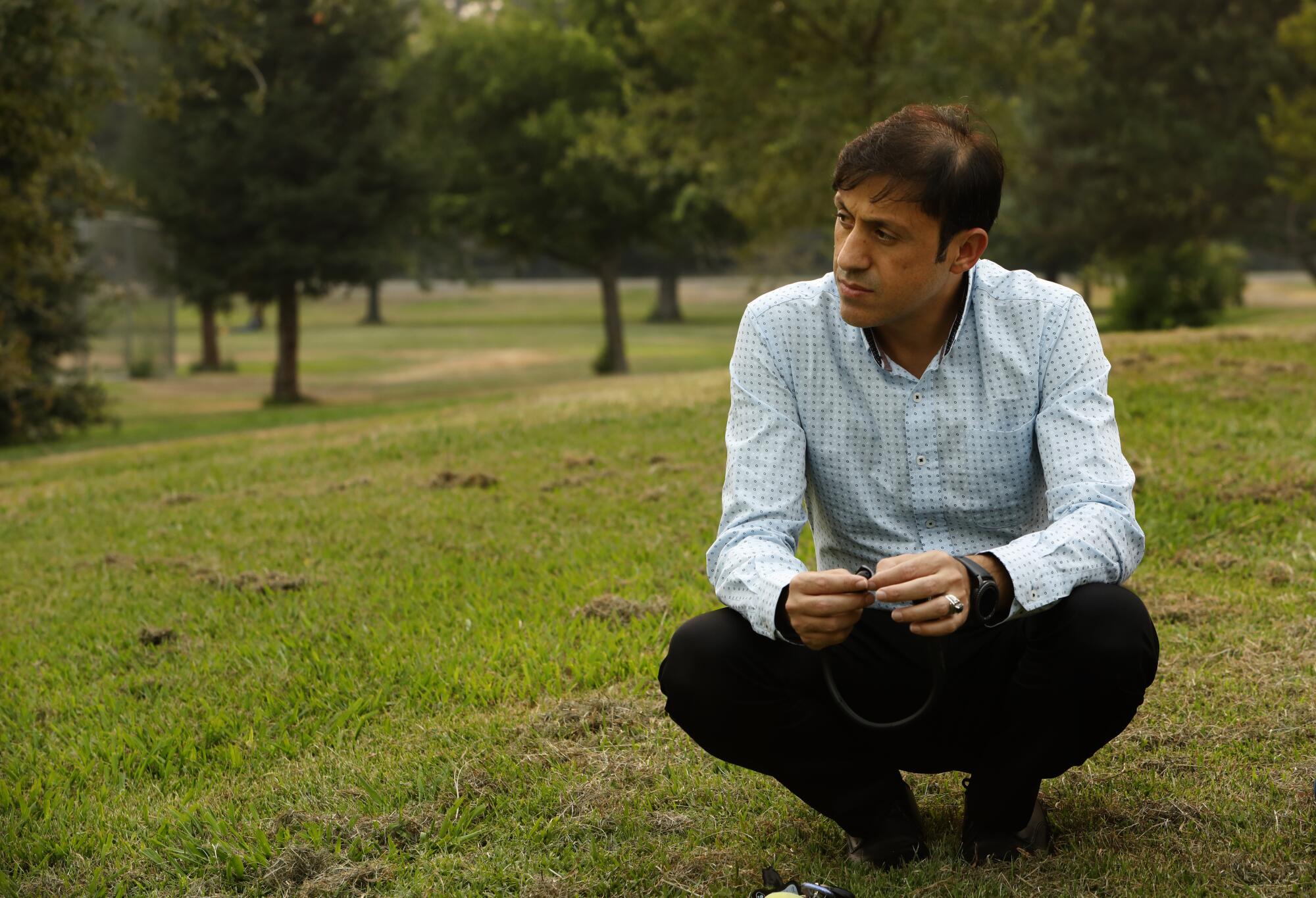
“People might say we are happy to be out of Afghanistan. It is completely the wrong statement. No one is happy to leave their home country behind,” said Lal Mohammad, sitting on a silver car shade used as a makeshift blanket in the park.
Mohammad managed guesthouses for expats in Afghanistan, handling a staff of 60. Like many around him, he said his hopes for America quickly turned into a “sad reality” that left him stuck working a warehouse job and scraping to pay for basics for his wife and five kids. Little aid came after their first few months in the state — he landed an apartment only after a fellow refugee agreed to cosign the lease and worked his way up to being an accountant (he has a finance degree) by taking part-time gigs.
An estimated 144,000 people of Afghan ancestry live in the United States, according to the 2019 American Community Survey. The diaspora’s migration came in three major influxes: the aftermath of the 1979 Soviet invasion of Afghanistan, the early 1990s under the first Taliban regime, and following the U.S.-led invasion of 2001.
“The city is getting nine months of people in three weeks. Seven families, eight families a night. You can’t keep up.”
— Kerry Ham, director of the Sacramento office of World Relief
Afghans have sought this area for nearly 20 years amid an eruption in housing prices in its sister enclave of Fremont in the Bay Area — Sacramento is now home to about 10,000 Afghans with special immigrant visas, the largest population in California, according to resettlement workers, while roughly 60,000 Afghan Americans live in the Bay Area. They have brought their culture with them, filling the neighborhood streets with markets that bake flatbread in fire ovens, changing the demographics of local schools and spawning a halal food truck that frequents the parking lot of the park.
Residents here also fear that the deals they made with the U.S. now threaten the lives of those they left behind — many of whom are ineligible to leave under current rules and are viewed by the Taliban as proxies for those who escaped. They say American policy ignores the realities of extended families, where aunts and uncles, siblings and cousins are little different than spouses and children.
“The U.S. should evacuate all our families for what we did,” said Wasel Hoshmand, a former military translator who came to Sacramento in 2014, as he played a game of cards with three others on the grass between the volleyball courts. “My service to the U.S. government has made them a huge target.”
On Friday evening, a U.S. State Department official speaking on background said grandchildren of special immigrant visa applicants who are unmarried and younger than 21 will now be allowed to join evacuation flights, adding that those who qualify under the new rule have been advised to consider going to the airport. The spokesperson said government officials are also putting “significant resources” into helping other eligible priority groups, but acknowledged vulnerable people “will face significant challenges fleeing to safety.”
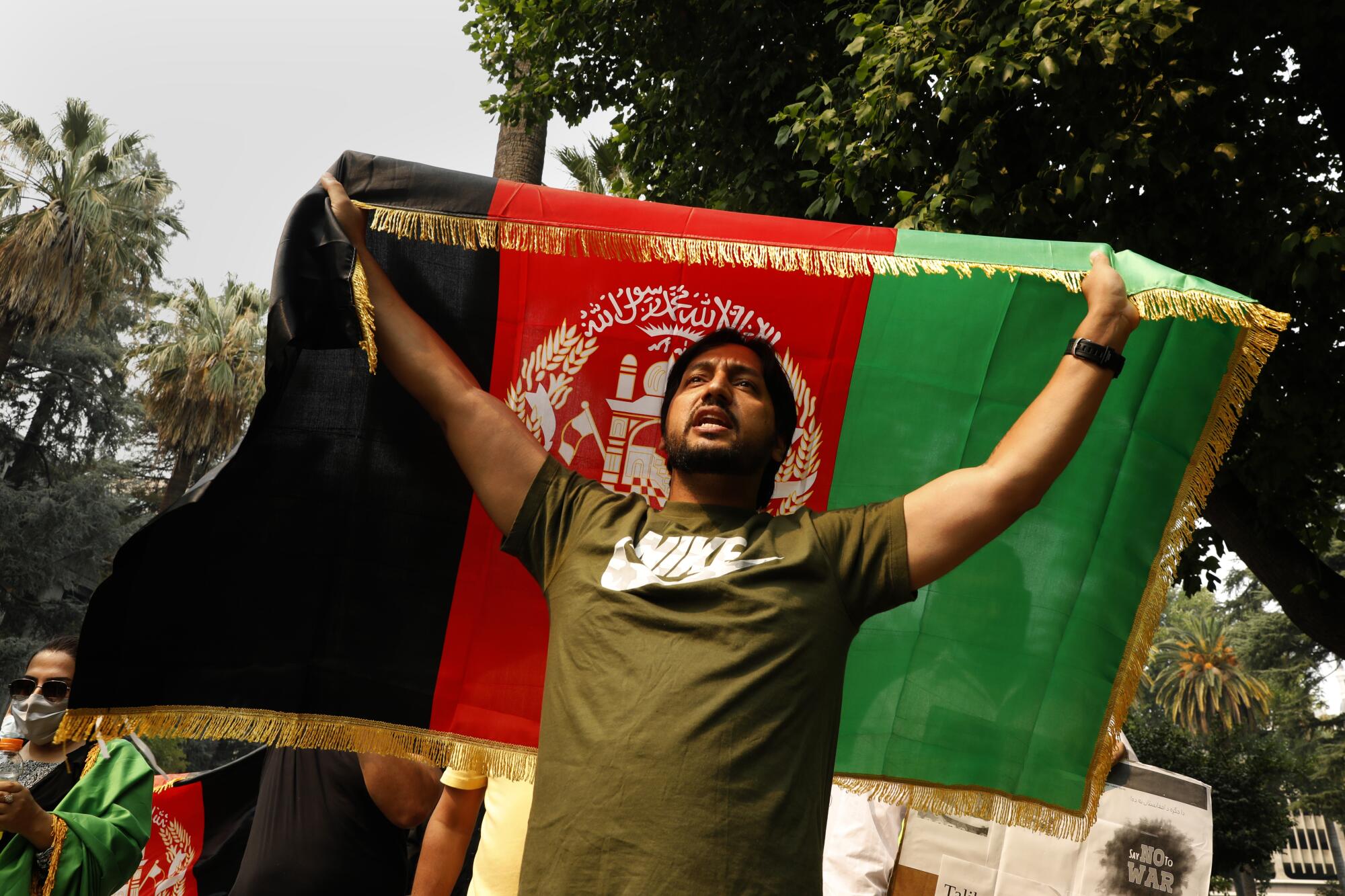
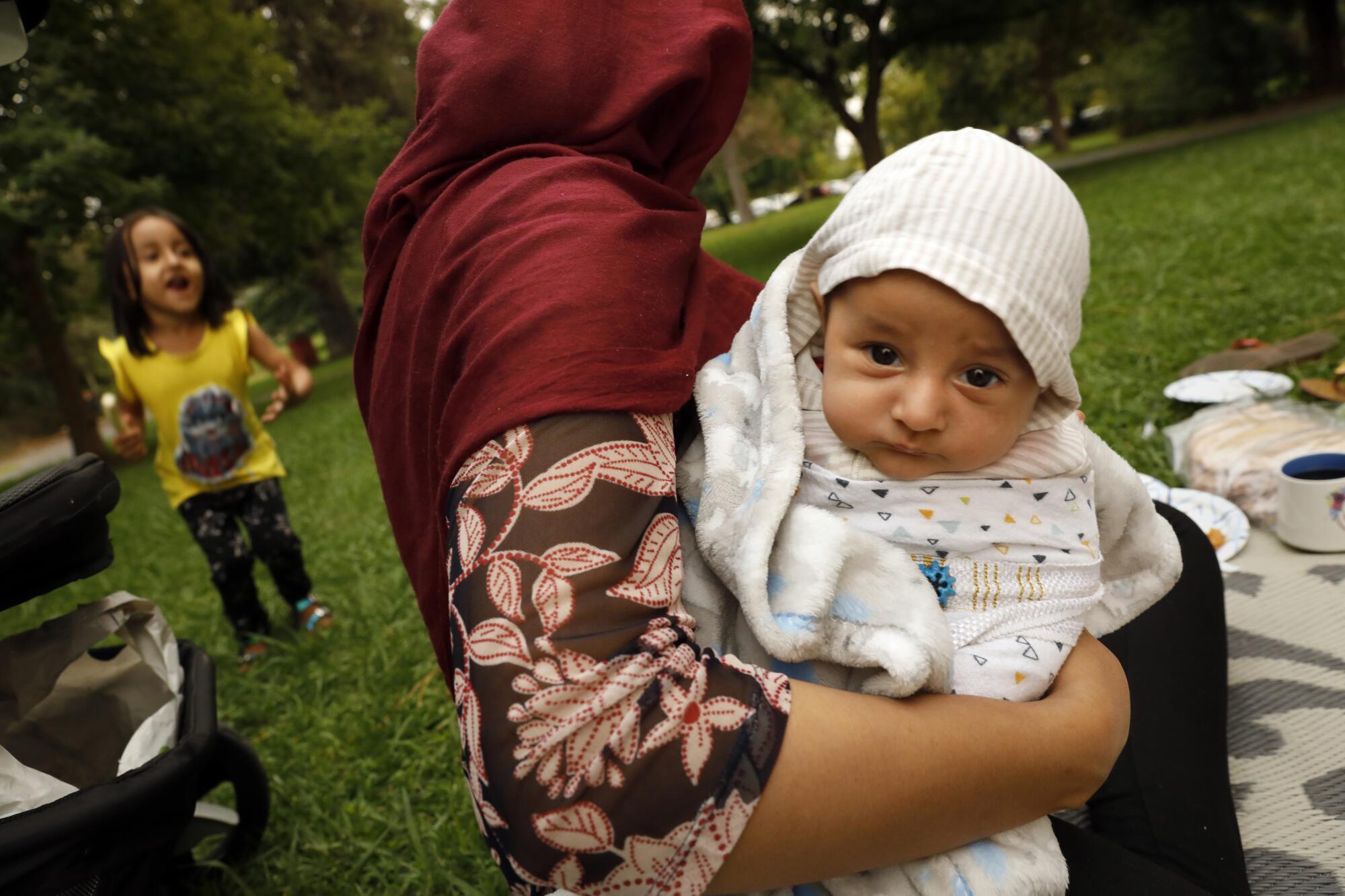
The number and pace of evacuations brought about by the U.S. withdrawal has also put a strain on resettlement agencies, mostly nonprofits that provide guidance and services for refugees when the first arrive.
Two of the largest agencies in Sacramento said that they have received more than 100 people in recent days, most landing with only a single piece of hand luggage.
With housing in the region already taxed by wildfire evacuees and the conversion of motels to house homeless people, organizations are scrambling to find shelter, said Lisa Welze, head of the International Rescue Committee in Sacramento. Pandemic restrictions forbid new arrivals from staying with host families during a 10-day quarantine, said Kerry Ham, director of the Sacramento office of World Relief.
“The city is getting nine months of people in three weeks,” he said. “Seven families, eight families a night. You can’t keep up.”
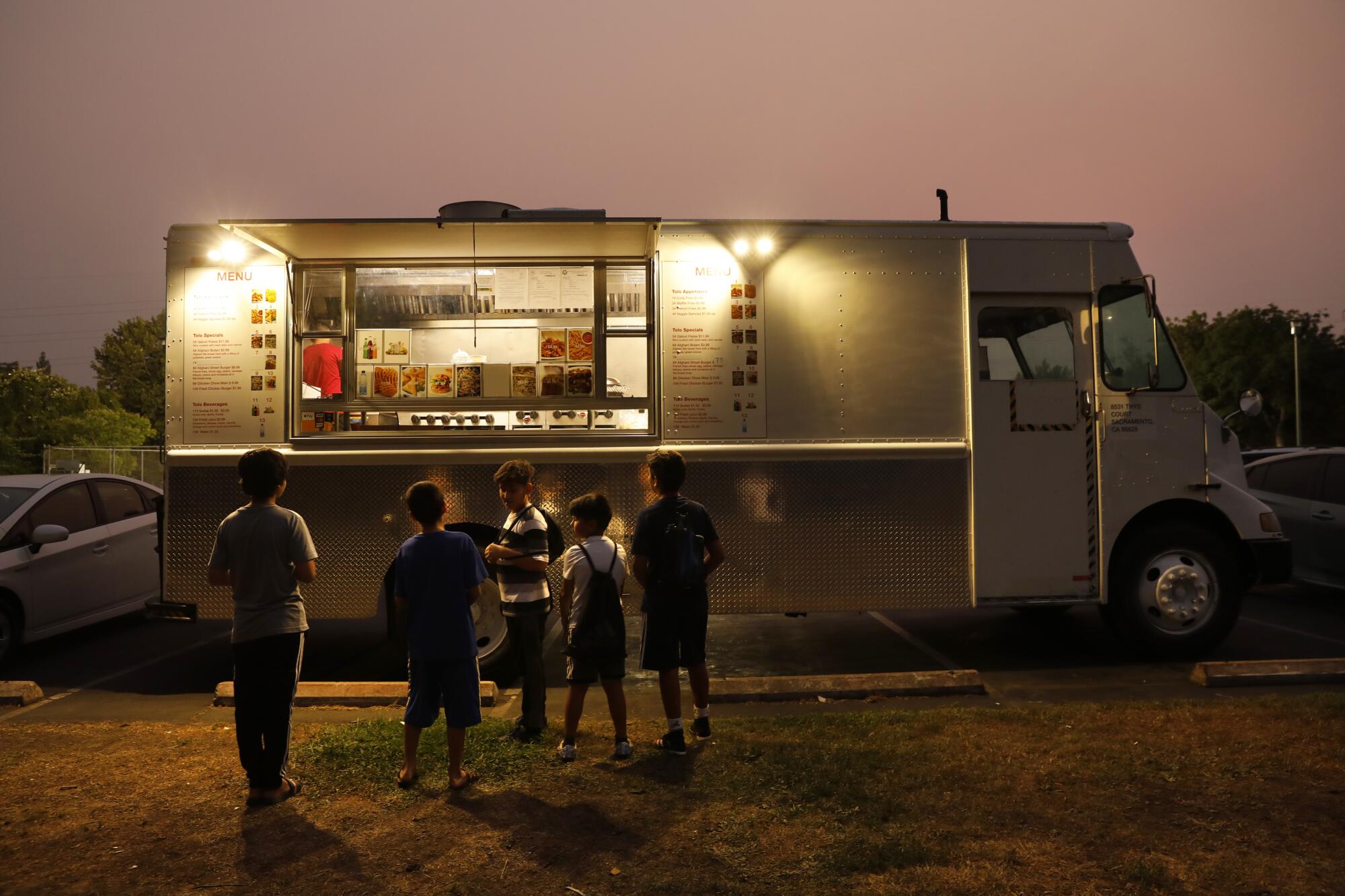
With requirements by landlords to show income of three times the rent and have a credit history, the housing market can be impenetrable, said Fouzia Azizi, director of refugee services at Jewish Family and Community Services East Bay.
“There are some frustration levels; expectations are high. They are coming from a decent lifestyle, and now they are coming in a situation where they have to stay in a neighborhood where they wouldn’t like to stay, or an apartment not up to their expectations.”
“My whole life was in Afghanistan. The things I needed were around me: a home to live, a car... Now, here in the U.S. I am starting from zero.”
— Asadullah, Afghan refugee
The Pittsburg apartment Asadullah was first shown earlier this month was unlivable — a far cry from the home he had left behind when he landed in the U.S. last week with his wife and daughters. The neighborhood was unsafe, he said, and unfit for a family with two little girls. The inside was spacious but dirty — from the bathrooms and beds to the “unpleasant” smell that met him the moment he stepped in.
“We have come a long way, and it was difficult to feel good there,” said the 31-year-old, who did not want his full name used for fear of reprisals against his family in Afghanistan.
His resettlement agency placed him in a hotel the next day. The room, with its two beds, doesn’t have a kitchen. The family cooks in his sister’s studio apartment and brings the food back to the hotel. They plan on staying there for about two weeks before moving into their full-time home, Asadullah said.
From his Oakland hotel room, he recalls the two-story home he lived in with his parents and sisters a “little castle we built after a lot of efforts and hard work.” He misses the pink and purple flowers he would see before leaving for work each morning.
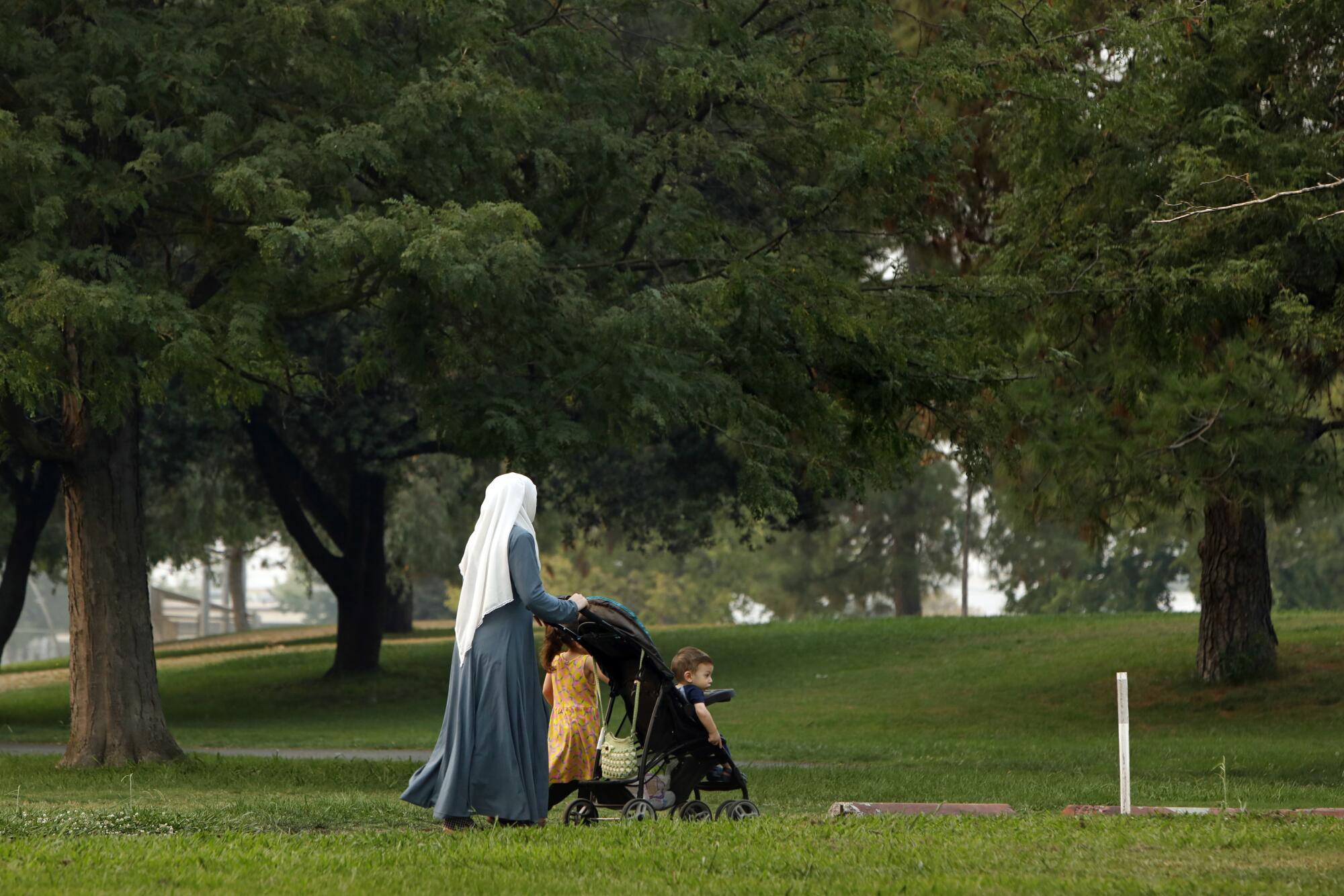
“My whole life was in Afghanistan,” he said. “The things I needed were around me: a home to live, a car and those basic items to make life easy. Now, here in the U.S. I am starting from zero and I have to make a lot of effort to get back part of what I had.”
Still, he said, he is grateful for his family’s safety.
Mohammad, the accountant, called the American withdrawal a “slap in the face.” Every night when he speaks to his mother in Kabul, she ends by telling him she is glad she has one son safe, even if the rest of her children are in danger.
“It’s a big lesson to other nations that fighting for the U.S., that one day they are going to leave you in hell so don’t trust them,” he said. “You just surrendered your own allies to terrorists.”
Ismail Khan, who works for No One Left Behind, a nonprofit charity that helps Afghans immigrate on special immigrant visas, estimates that about 30,000 people are in the slow-moving pipeline for those official and coveted passes.
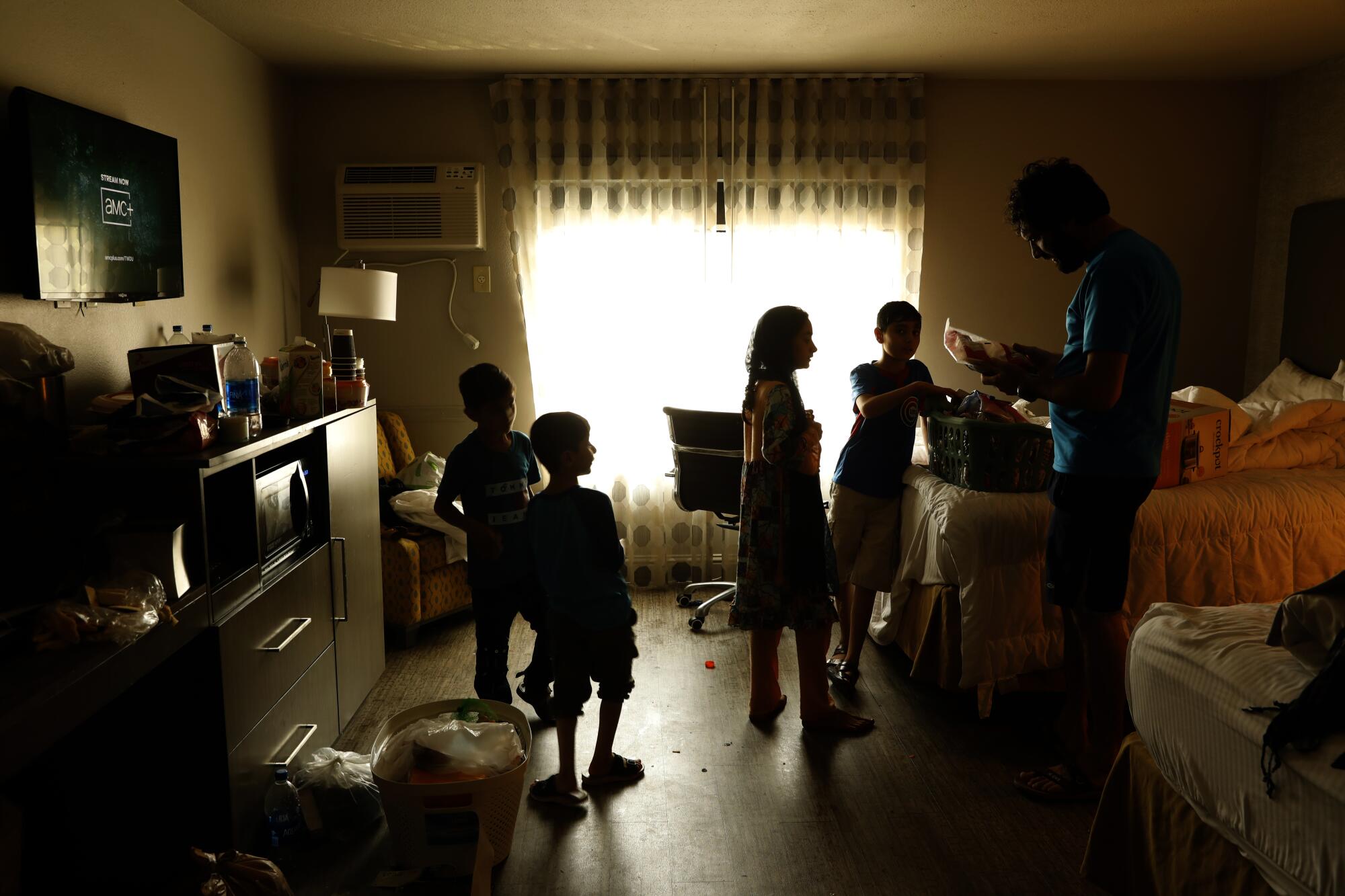
President Biden vowed to airlift out up to 9,000 people, including remaining Americans, each day before an Aug. 31 deadline to leave the country — though far fewer than that have been evacuated in recent days.
But Khan and other experts argue that the number of vulnerable people who may face retaliation by the Taliban is much higher — up to 100,000 if government workers, women in leadership roles and peripheral support workers such as cleaning ladies and drivers and others who worked for Americans are counted, and as many as 500,000 if their extended families are included.
For them, the chance of getting a space aboard an American plane seems remote, as commercial flights are halted and borders have fallen under Taliban control.
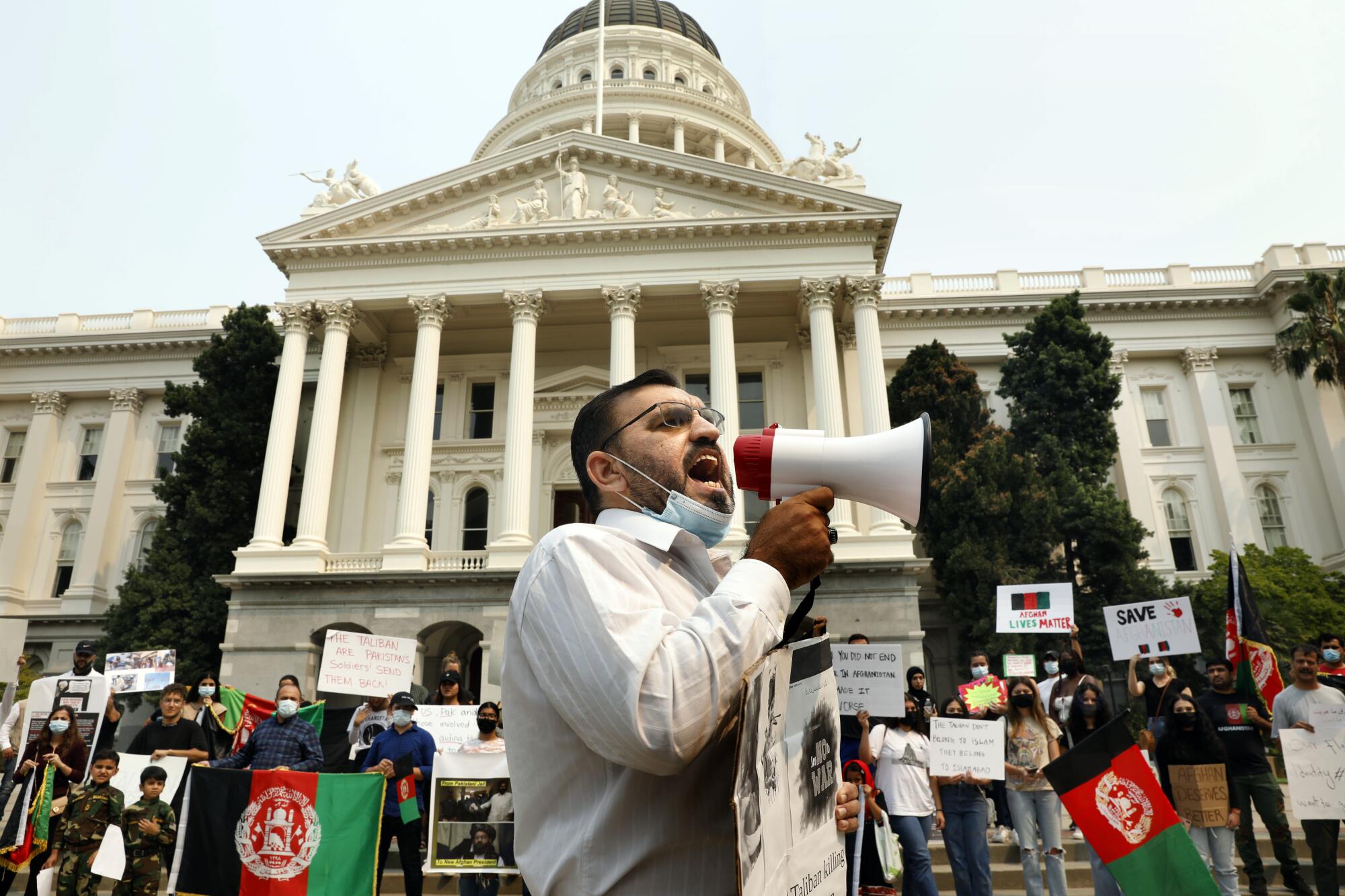
Thirty-eight members of Khan’s family — his parents, siblings, nieces and nephews — have fled their home and are in hiding in four separate locations, certain that Taliban troops will show little mercy for their cooperation with the United States if they are found.
“If anything happens to them, I don’t know how I would live with that burden,” Khan said. “I am trying everything to take them out of the kill zone.”
In recent days, those in the diaspora have found themselves becoming the sole financial resource for their families abroad as many Afghans have not been able to access their savings because most banks are closed.
Farad Yousafzai purchased 11 tickets on a commercial flight to Turkey to get some of his family out of Afghanistan on Friday night before the Taliban’s takeover.
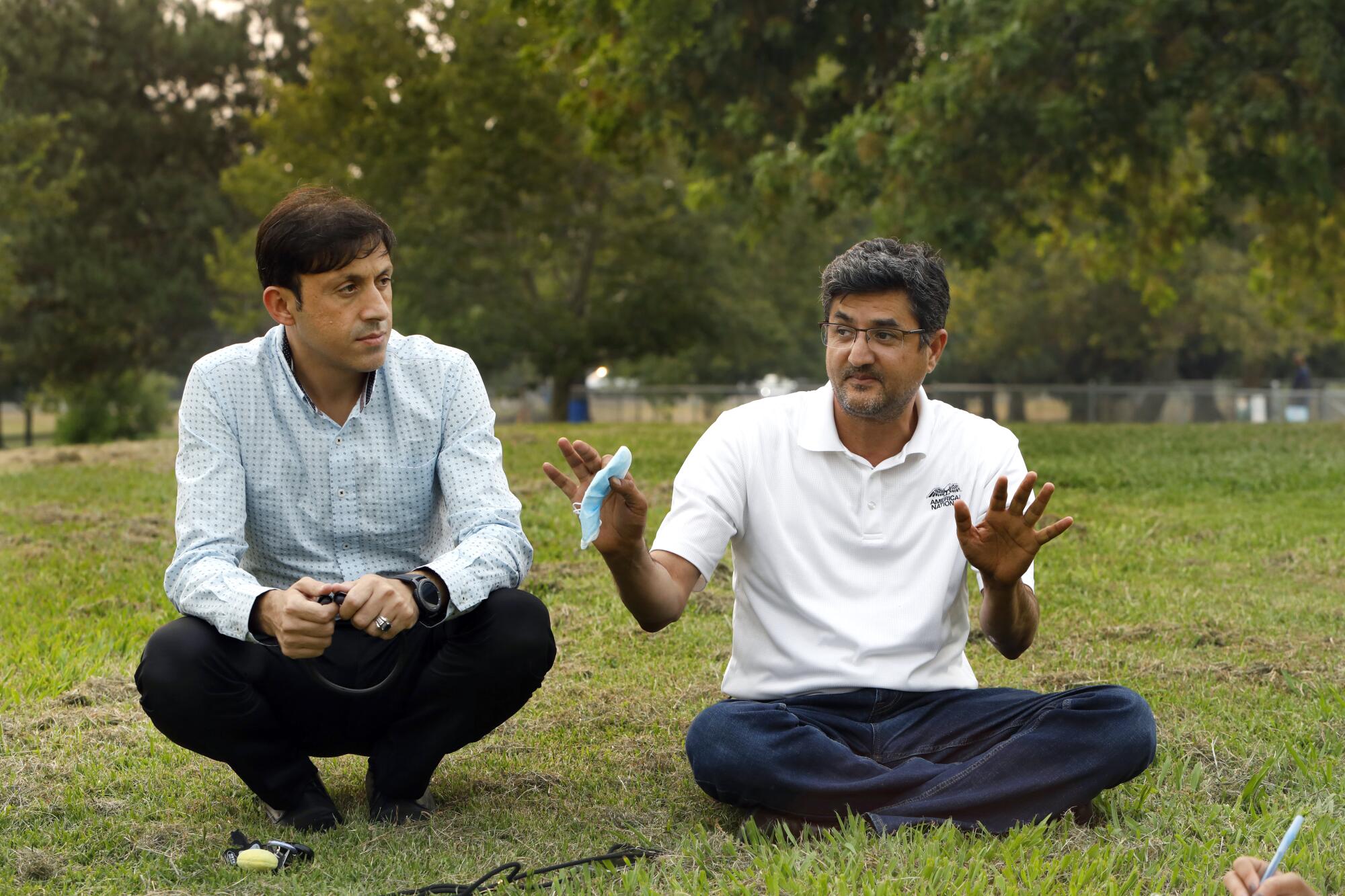
Yousafzai, who was in escrow on a house in Sacramento, borrowed cash from a friend in Kabul to cover the airfare and visas and must raid part of his down payment money to repay it — if he can’t negotiate with the seller, he may lose both the house and the remaining deposit. Now his sisters are calling for help, but commercial flights have shut down. His family in Turkey needs money and a place to go when their visas run out.
He has started taking pills at night to get some rest, he said. But in the day, he can’t stop trying to help, speaking at a protest at the state Capitol on Thursday where about 60 Afghan Americans gathered.
Nahila Habib, 19, came with three of her female cousins — all teens — holding a bubble-lettered sign that read: “The U.S. doesn’t accept refugees. They make them.”
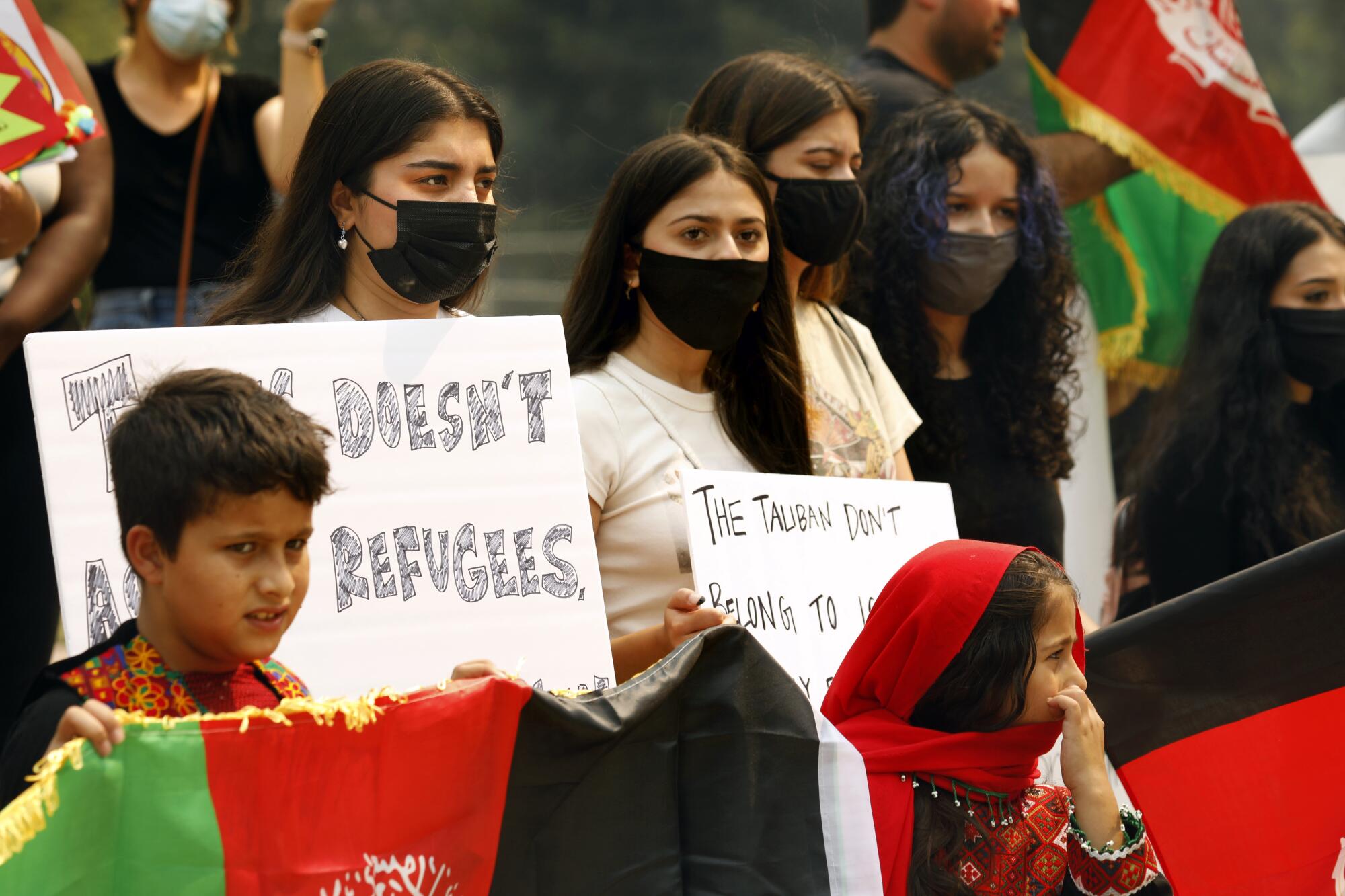
Habib, who was born in Pakistan after her family fled there after the first Taliban takeover, said that “seeing my parents experience this again has just been awful.”
Her mother married at 15 to avoid the threat of the Taliban, she said. Her father has told her stories of being a cab driver in Kabul, with Taliban fighters putting a gun to his head to commandeer his services. Usually stoic, she said, he has been crying every night.
Her grandparents, who have lived with her part time for a decade and just became U.S. citizens, are trapped in Kabul, unable to reach the airport because the routes are blocked by Taliban fighters.

Habib has been talking to two of her younger cousins in Kabul, girls aged 14 and 15. They are hiding inside, she said, unable to go out and facing the prospect that they will not be able to return to school.
Habib said the younger cousin told her, “I’d rather be dead than experience this.” It was hard to stomach that sentiment.
“We don’t do anything but cry,” she said. “There is nothing you can do.”
That sense of helplessness for Afghans here seems baked into the air, dirty brown with wildfire smoke, dimly lit by an apocalyptic orange sun hanging heavy in the still sky.
“That’s how we feel right now,” said Emal Salarzai, an Afghan refugee whose father and uncles are on the run from the Taliban, gesturing at the grim landscape.
“Desperate, frustrated, restless.”
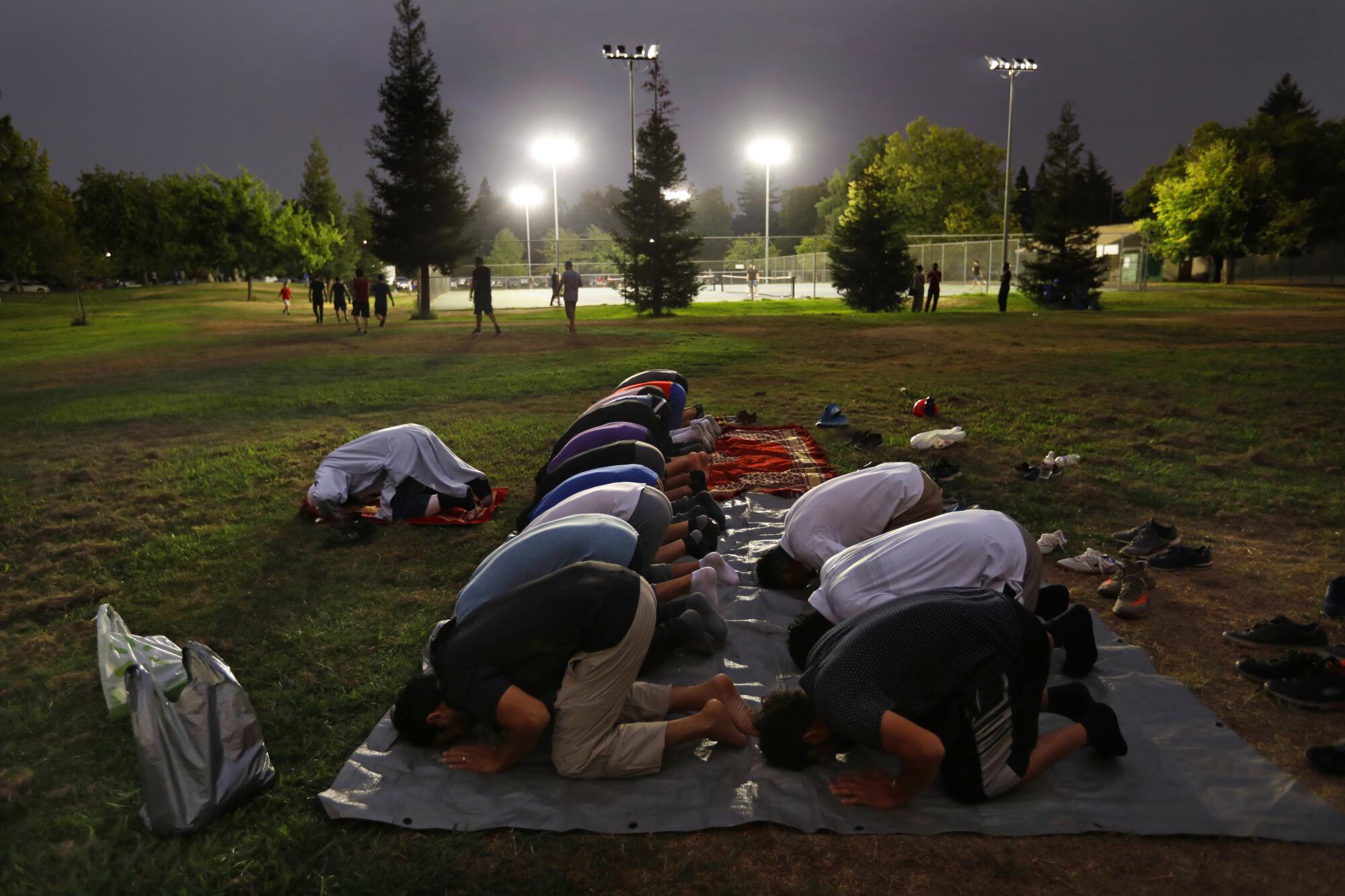
More to Read
Sign up for Essential California
The most important California stories and recommendations in your inbox every morning.
You may occasionally receive promotional content from the Los Angeles Times.



